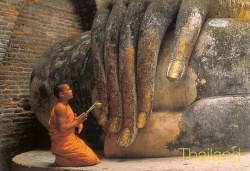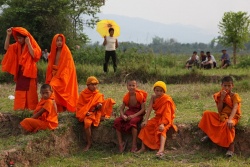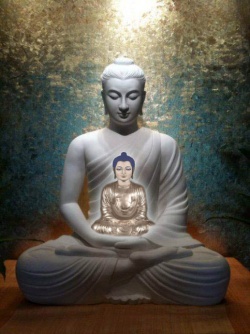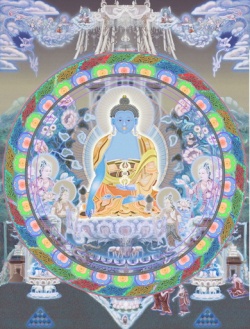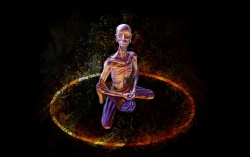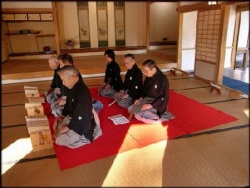Difference between revisions of "Vajirāsuttaṁ: The Discourse about Vajirā"
(Created page with "<nomobile>{{DisplayImages|1933|1478|2286|3979|751|70|1730|3305}}</nomobile> {{Centre|<big><big>Vajirāsuttaṁ<br/> The Discourse about Vajirā </big></big>}} <poem> 171....") |
|||
| Line 7: | Line 7: | ||
Thus I have heard: | Thus I have heard: | ||
| − | ekaṁ samayaṁ Bhagavā Sāvatthiyaṁ viharati | + | ekaṁ samayaṁ [[Bhagavā]] Sāvatthiyaṁ viharati |
| − | at one time the Gracious One was dwelling near Sāvatthī | + | at one time the Gracious One was dwelling near [[Sāvatthī]] |
| − | Jetavane Anāthapiṇḍikassa ārāme. | + | [[Jetavane]] Anāthapiṇḍikassa ārāme. |
| − | at Anāthapiṇḍika's grounds in Jeta's Wood. | + | at Anāthapiṇḍika's grounds in Jeta's [[Wood]]. |
| − | Atha kho Vajirā bhikkhunī, pubbaṇhasamayaṁ nivāsetvā, | + | Atha kho Vajirā [[bhikkhunī]], pubbaṇhasamayaṁ nivāsetvā, |
| − | Then the nun Vajirā, having dressed in the morning time, | + | Then the [[nun]] Vajirā, having dressed in the morning time, |
pattacīvaram-ādāya, Sāvatthiṁ piṇḍāya pāvisi. | pattacīvaram-ādāya, Sāvatthiṁ piṇḍāya pāvisi. | ||
| − | after picking up her bowl and robe, was entering Sāvatthī for alms. | + | after picking up her [[bowl]] and robe, was entering [[Sāvatthī]] for [[alms]]. |
Sāvatthiyaṁ piṇḍāya caritvā, pacchābhattaṁ piṇḍapātapaṭikkantā, | Sāvatthiyaṁ piṇḍāya caritvā, pacchābhattaṁ piṇḍapātapaṭikkantā, | ||
| − | After walking for alms in Sāvatthī, and returning from the alms-round after the meal, | + | After walking for [[alms]] in [[Sāvatthī]], and returning from the [[alms-round]] after the meal, |
yena Andhavanaṁ tenupasaṅkami divāvihārāya, | yena Andhavanaṁ tenupasaṅkami divāvihārāya, | ||
| − | she approached the Blind Man's Wood to pass the day, | + | she approached the [[Blind]] Man's [[Wood]] to pass the day, |
Andhavanaṁ ajjhogahetvā, | Andhavanaṁ ajjhogahetvā, | ||
| − | and having entered Blind Man's Wood, | + | and having entered [[Blind]] Man's [[Wood]], |
aññatarasmiṁ rukkhamūle divāvihāraṁ nisīdi. | aññatarasmiṁ rukkhamūle divāvihāraṁ nisīdi. | ||
| − | she sat down at the root of a certain tree to pass the day. | + | she sat down at the [[root]] of a certain [[tree]] to pass the day. |
Atha kho Māro Pāpimā | Atha kho Māro Pāpimā | ||
| − | Then the Wicked Māra | + | Then the Wicked [[Māra]] |
Vajirāya bhikkhuniyā bhayaṁ chambhitattaṁ lomahaṁsaṁ uppādetukāmo, | Vajirāya bhikkhuniyā bhayaṁ chambhitattaṁ lomahaṁsaṁ uppādetukāmo, | ||
| − | desiring to give rise to fear, terror, and horror in the nun Vajirā, | + | [[desiring]] to give rise to {{Wiki|fear}}, {{Wiki|terror}}, and [[horror]] in the [[nun]] Vajirā, |
| − | samādhimhā cāvetukāmo, yena Vajirā bhikkhunī tenupasaṅkami, | + | samādhimhā cāvetukāmo, yena Vajirā [[bhikkhunī]] tenupasaṅkami, |
| − | desiring to drive her out of concentration, approached the nun Vajirā, | + | [[desiring]] to drive her out of [[concentration]], approached the [[nun]] Vajirā, |
| − | upasaṅkamitvā Vajiraṁ bhikkhuniṁ gāthāya ajjhabhāsi: | + | upasaṅkamitvā Vajiraṁ bhikkhuniṁ gāthāya [[ajjhabhāsi]]: |
| − | and after approaching he addressed the nun Vajirā with a verse: | + | and after approaching he addressed the [[nun]] Vajirā with a verse: |
| − | “Kenāyaṁ pakato satto, kuvaṁ sattassa kārako, | + | “Kenāyaṁ pakato [[satto]], kuvaṁ sattassa kārako, |
“By whom was this being made, just where is this being's maker, | “By whom was this being made, just where is this being's maker, | ||
| − | Kuvaṁ satto samuppanno, kuvaṁ satto nirujjhatī.” ti | + | Kuvaṁ [[satto]] samuppanno, kuvaṁ [[satto]] nirujjhatī.” ti |
Where has this being arisen, and just where does this being cease?” | Where has this being arisen, and just where does this being cease?” | ||
| Line 54: | Line 54: | ||
Atha kho Vajirāya bhikkhuniyā etad-ahosi: | Atha kho Vajirāya bhikkhuniyā etad-ahosi: | ||
| − | Then it occurred to the nun Vajirā: | + | Then it occurred to the [[nun]] Vajirā: |
“Ko nu khvāyaṁ manusso vā amanusso vā gāthaṁ bhāsatī?” ti | “Ko nu khvāyaṁ manusso vā amanusso vā gāthaṁ bhāsatī?” ti | ||
| − | “Who is this, a human or a non-human, speaking this verse?” | + | “Who is this, a [[human]] or a {{Wiki|non-human}}, {{Wiki|speaking}} this verse?” |
Atha kho Vajirāya bhikkhuniyā etad-ahosi: | Atha kho Vajirāya bhikkhuniyā etad-ahosi: | ||
| − | Then it occurred to the nun Vajirā: | + | Then it occurred to the [[nun]] Vajirā: |
“Māro kho ayaṁ Pāpimā | “Māro kho ayaṁ Pāpimā | ||
| − | “This is the Wicked Māra | + | “This is the Wicked [[Māra]] |
mama bhayaṁ chambhitattaṁ lomahaṁsaṁ uppādetukāmo, | mama bhayaṁ chambhitattaṁ lomahaṁsaṁ uppādetukāmo, | ||
| − | desiring to give rise to fear, terror, and horror in me, | + | [[desiring]] to give rise to {{Wiki|fear}}, {{Wiki|terror}}, and [[horror]] in me, |
samādhimhā cāvetukāmo, gāthaṁ bhāsatī.” ti | samādhimhā cāvetukāmo, gāthaṁ bhāsatī.” ti | ||
| − | desiring to drive me out of concentration, who speaks this verse.” | + | [[desiring]] to drive me out of [[concentration]], who speaks this verse.” |
| − | Atha kho Vajirā bhikkhunī: Māro ayaṁ Pāpimā iti viditvā, | + | Atha kho Vajirā [[bhikkhunī]]: Māro ayaṁ Pāpimā iti viditvā, |
| − | Then the nun Vajirā having understood: This is the Wicked Māra, | + | Then the [[nun]] Vajirā having understood: This is the Wicked [[Māra]], |
Māraṁ Pāpimantaṁ gāthāhi paccabhāsi: | Māraṁ Pāpimantaṁ gāthāhi paccabhāsi: | ||
| − | replied with these verses to the Wicked Māra: | + | replied with these verses to the Wicked [[Māra]]: |
| − | “Kiṁ nu satto ti paccesi? Māra Diṭṭhigataṁ nu te? | + | “Kiṁ nu [[satto]] ti paccesi? [[Māra]] Diṭṭhigataṁ nu te? |
| − | “Why fall back on a 'being'? Haven't you come to a view, Māra? | + | “Why fall back on a 'being'? Haven't you come to a view, [[Māra]]? |
Suddhasaṅkhārapuñjoyaṁ, na-y-idha sattupalabbhati. | Suddhasaṅkhārapuñjoyaṁ, na-y-idha sattupalabbhati. | ||
| − | This is just a bunch of processes, no being is to be found here. <ref>{{Nolinking|Comm: na-y-idha sattupalabbhatī ti imasmiṁ suddhasaṅkhārapuñje paramatthato 'satto' nāma na upalabbhati;}} no being is to be found here means in this bunch of pure processes nothing known as 'a being' is found in the ultimate sense.</ref> | + | This is just a bunch of {{Wiki|processes}}, no being is to be found here. <ref>{{Nolinking|Comm: na-y-idha sattupalabbhatī ti imasmiṁ suddhasaṅkhārapuñje paramatthato 'satto' nāma na upalabbhati;}} no being is to be found here means in this bunch of [[pure]] {{Wiki|processes}} nothing known as 'a being' is found in the [[Wikipedia:Absolute (philosophy)|ultimate]] [[sense]].</ref> |
| − | Yathā hi aṅgasambhārā hoti saddo 'ratho' iti, | + | [[Yathā]] hi aṅgasambhārā hoti saddo 'ratho' iti, |
| − | Just as with a collection of parts the sound 'chariot' is said, | + | Just as with a collection of parts the [[sound]] '[[chariot]]' is said, |
| − | Evaṁ khandhesu santesu hoti 'satto' ti sammuti. | + | Evaṁ khandhesu santesu hoti '[[satto]]' ti [[sammuti]]. |
| − | So when there are these constituents <ref>{{Nolinking|Comm: khandhesu santesū ti pañcasu khandhesu vijjamānesu tena tenākārena vavatthitesu;}} when there are these constituents means when there are these five constituents existing then it is fixed through that state.</ref> a 'being' is determined on. <ref>{{Nolinking|Comm: sammutī ti satto ti samaññā-mattam-eva hoti;}} a being is determined on means there is just this appellation</ref> | + | So when there are these constituents <ref>{{Nolinking|Comm: khandhesu santesū ti pañcasu khandhesu vijjamānesu tena tenākārena vavatthitesu;}} when there are these constituents means when there are these five constituents [[existing]] then it is fixed through that [[state]].</ref> a 'being' is determined on. <ref>{{Nolinking|Comm: sammutī ti satto ti samaññā-mattam-eva hoti;}} a being is determined on means there is just this appellation</ref> |
Dukkham-eva hi sambhoti, dukkhaṁ tiṭṭhati veti ca, | Dukkham-eva hi sambhoti, dukkhaṁ tiṭṭhati veti ca, | ||
| − | Only suffering <ref>{{Nolinking|Comm: dukkhan-ti pañcakkhandhadukkhaṁ; }}suffering means the suffering in the five constituents.</ref> arises, suffering it is that persists, | + | Only [[suffering]] <ref>{{Nolinking|Comm: dukkhan-ti pañcakkhandhadukkhaṁ; }}[[suffering]] means the [[suffering]] in the five constituents.</ref> arises, [[suffering]] it is that persists, |
| − | Nāññatra dukkhā sambhoti, nāññaṁ dukkhā nirujjhatī.” ti | + | Nāññatra [[dukkhā]] sambhoti, nāññaṁ [[dukkhā]] nirujjhatī.” ti |
| − | Nothing other than sufferings arise, just sufferings that cease.” <ref>{{Nolinking|Comm: nāññatra dukkhā ti ṭhapetvā dukkhaṁ añño neva sambhoti na nirujjhatī ti;}} nothing other than sufferings means except for suffering nothing else arises or ceases.</ref> | + | Nothing other than [[sufferings]] arise, just [[sufferings]] that cease.” <ref>{{Nolinking|Comm: nāññatra dukkhā ti ṭhapetvā dukkhaṁ añño neva sambhoti na nirujjhatī ti;}} nothing other than [[sufferings]] means except for [[suffering]] nothing else arises or ceases.</ref> |
| − | Atha kho Māro Pāpimā: | + | Atha kho Māro Pāpimā: “[[Jānāti]] maṁ Vajirā [[bhikkhunī]]!” ti |
| − | Then the Wicked Māra (thought): “The nun Vajirā knows me!” | + | Then the Wicked [[Māra]] ([[thought]]): “The [[nun]] Vajirā [[knows]] me!” |
dukkhī dummano tatthevantaradhāyī ti. | dukkhī dummano tatthevantaradhāyī ti. | ||
| − | and pained and depressed he vanished right there. | + | and pained and {{Wiki|depressed}} he vanished right there. |
</poem> | </poem> | ||
Latest revision as of 14:12, 16 May 2015
Vajirāsuttaṁ
The Discourse about Vajirā
171. Evaṁ me sutaṁ:
Thus I have heard:
ekaṁ samayaṁ Bhagavā Sāvatthiyaṁ viharati
at one time the Gracious One was dwelling near Sāvatthī
Jetavane Anāthapiṇḍikassa ārāme.
at Anāthapiṇḍika's grounds in Jeta's Wood.
Atha kho Vajirā bhikkhunī, pubbaṇhasamayaṁ nivāsetvā,
Then the nun Vajirā, having dressed in the morning time,
pattacīvaram-ādāya, Sāvatthiṁ piṇḍāya pāvisi.
after picking up her bowl and robe, was entering Sāvatthī for alms.
Sāvatthiyaṁ piṇḍāya caritvā, pacchābhattaṁ piṇḍapātapaṭikkantā,
After walking for alms in Sāvatthī, and returning from the alms-round after the meal,
yena Andhavanaṁ tenupasaṅkami divāvihārāya,
she approached the Blind Man's Wood to pass the day,
Andhavanaṁ ajjhogahetvā,
and having entered Blind Man's Wood,
aññatarasmiṁ rukkhamūle divāvihāraṁ nisīdi.
she sat down at the root of a certain tree to pass the day.
Atha kho Māro Pāpimā
Then the Wicked Māra
Vajirāya bhikkhuniyā bhayaṁ chambhitattaṁ lomahaṁsaṁ uppādetukāmo,
desiring to give rise to fear, terror, and horror in the nun Vajirā,
samādhimhā cāvetukāmo, yena Vajirā bhikkhunī tenupasaṅkami,
desiring to drive her out of concentration, approached the nun Vajirā,
upasaṅkamitvā Vajiraṁ bhikkhuniṁ gāthāya ajjhabhāsi:
and after approaching he addressed the nun Vajirā with a verse:
“Kenāyaṁ pakato satto, kuvaṁ sattassa kārako,
“By whom was this being made, just where is this being's maker,
Kuvaṁ satto samuppanno, kuvaṁ satto nirujjhatī.” ti
Where has this being arisen, and just where does this being cease?”
Atha kho Vajirāya bhikkhuniyā etad-ahosi:
Then it occurred to the nun Vajirā:
“Ko nu khvāyaṁ manusso vā amanusso vā gāthaṁ bhāsatī?” ti
“Who is this, a human or a non-human, speaking this verse?”
Atha kho Vajirāya bhikkhuniyā etad-ahosi:
Then it occurred to the nun Vajirā:
“Māro kho ayaṁ Pāpimā
“This is the Wicked Māra
mama bhayaṁ chambhitattaṁ lomahaṁsaṁ uppādetukāmo,
desiring to give rise to fear, terror, and horror in me,
samādhimhā cāvetukāmo, gāthaṁ bhāsatī.” ti
desiring to drive me out of concentration, who speaks this verse.”
Atha kho Vajirā bhikkhunī: Māro ayaṁ Pāpimā iti viditvā,
Then the nun Vajirā having understood: This is the Wicked Māra,
Māraṁ Pāpimantaṁ gāthāhi paccabhāsi:
replied with these verses to the Wicked Māra:
“Kiṁ nu satto ti paccesi? Māra Diṭṭhigataṁ nu te?
“Why fall back on a 'being'? Haven't you come to a view, Māra?
Suddhasaṅkhārapuñjoyaṁ, na-y-idha sattupalabbhati.
This is just a bunch of processes, no being is to be found here. [1]
Yathā hi aṅgasambhārā hoti saddo 'ratho' iti,
Just as with a collection of parts the sound 'chariot' is said,
Evaṁ khandhesu santesu hoti 'satto' ti sammuti.
So when there are these constituents [2] a 'being' is determined on. [3]
Dukkham-eva hi sambhoti, dukkhaṁ tiṭṭhati veti ca,
Only suffering [4] arises, suffering it is that persists,
Nāññatra dukkhā sambhoti, nāññaṁ dukkhā nirujjhatī.” ti
Nothing other than sufferings arise, just sufferings that cease.” [5]
Atha kho Māro Pāpimā: “Jānāti maṁ Vajirā bhikkhunī!” ti
Then the Wicked Māra (thought): “The nun Vajirā knows me!”
dukkhī dummano tatthevantaradhāyī ti.
and pained and depressed he vanished right there.
Footnotes
- ↑ Comm: na-y-idha sattupalabbhatī ti imasmiṁ suddhasaṅkhārapuñje paramatthato 'satto' nāma na upalabbhati; no being is to be found here means in this bunch of pure processes nothing known as 'a being' is found in the ultimate sense.
- ↑ Comm: khandhesu santesū ti pañcasu khandhesu vijjamānesu tena tenākārena vavatthitesu; when there are these constituents means when there are these five constituents existing then it is fixed through that state.
- ↑ Comm: sammutī ti satto ti samaññā-mattam-eva hoti; a being is determined on means there is just this appellation
- ↑ Comm: dukkhan-ti pañcakkhandhadukkhaṁ; suffering means the suffering in the five constituents.
- ↑ Comm: nāññatra dukkhā ti ṭhapetvā dukkhaṁ añño neva sambhoti na nirujjhatī ti; nothing other than sufferings means except for suffering nothing else arises or ceases.
